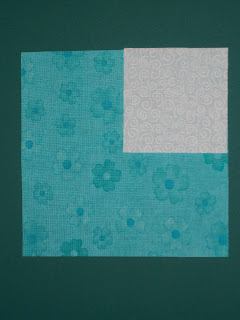 A while back on twitter I asked what a square with a small half square triangle (HST) on one of the corners is called. We decided it was called 'corner triangles'. Then I went to my quilting class that week and found out that the term is called connectors, although I like corner triangles better.
A while back on twitter I asked what a square with a small half square triangle (HST) on one of the corners is called. We decided it was called 'corner triangles'. Then I went to my quilting class that week and found out that the term is called connectors, although I like corner triangles better. On Wednesdays post about the Friendly Quilt Along I promised to show you a way to sew the connectors on...
"On Saturday, October 8th I will be showing you a very easy way to sew the connector squares on with out pinning or drawing on the back of the small square or even just guessing where the diagonal really is. It's a fool proof way that will make this quilt go fast."
Like so many other things I learned this technique from Gail at The Berry Patch. She is probably the most knowledgeable quilter I know, I always learn something new and wonderful at her classes.
For each square you will need a larger square (mine is 5") and a smaller square (mine is 2.5"). These sizes are not set in stone, your pattern might be different.
1. First you need to get your machine ready. Do you have a marked line (like with a sharpie) or a piece of take along your 1/4" line? Just about everyone I know around here does. What you do is put your needle in the down position and raise your presser foot. Insert a ruler against the needle and lower your presser foot. Line up a line on your ruler perpendicular to a line on your machine table so you know your ruler is straight, ie. the 4" line on the ruler. Then with a fine point sharpie draw a line against the ruler or place a 1/4" piece of tape in the same spot. I didn't have any 1/4" tape when I did this so I used a piece of painters tape that I cut with my rotary cutter to 1/4". And don't worry about the sharpie, you can always remove it with denatured alcohol.
Now you are ready to start piecing.
2. Take your 5" square and place the 2.5" square on one corner, right sides together. Make sure the corner and edges line up. When I talk about the top left and bottom right part of the small square it is from this position I am referring to.
3. Take the squares to your machine. You will start sewing from the top left corner of the small square and sew down to the bottom right corner. Line your top left point up with your needle and the bottom right corner with the left side of the tape. Stitch down the center of the triangle, watching the tape line (your machine will keep sewing if you look away from the presser foot and needle for this, I promise).
If your bottom right corner of the small square follows the line the needle will end up right at the bottom right corner. There you have a perfect diagonal line.
4. Press the square over to make a triangle.
5. Normally you would be told to trim the bottom 2 pieces under the triangle, but I think it's best to only trim the center. If you are off by any amount (and lets face who isn't at times) keeping the bottom part (in other words the part of the big square) will keep your square integrity and give you the correct line to sew on.
There you have it...an easy way to sew on the diagonal...no pins, no pencils and no guessing.
There's so many applications this can be used for, not just connector squares. Can you think of any others?
I am off to Quilt Sitters and Sit and Sew at The Berry Patch today and will pick a winner of the Quilting Design Wizard later. If you haven't entered I am giving you a few more hours :)
Are you planning on joining the Friendly Quilt Along? I hope so, this is a great quilt and is so easy now that you know how to make these pieces.
Sha :)





Thanks. I have done many connector triangles; but, this does seem like an easier and faster way to get it done. I've always pressed a crease on the small square, which becomes tedius if you are doing a lot. I will try your method next time.
ReplyDeleteThank you for this! I sure could have used this idea for the lantern quilt I am making. Next time!
ReplyDeleteOh this is a big help Sha!! Thanks for sharing.
ReplyDeleteThis comment has been removed by the author.
ReplyDeleteThank you for the informative tutorial
ReplyDeleteCarolyn
Love this tute Sharon!
ReplyDelete